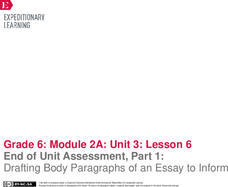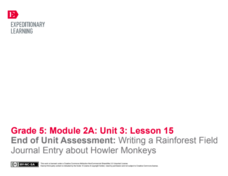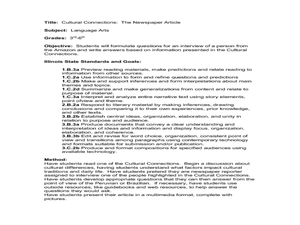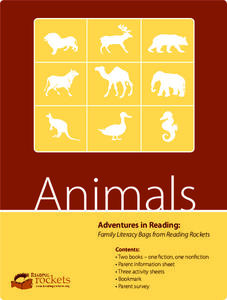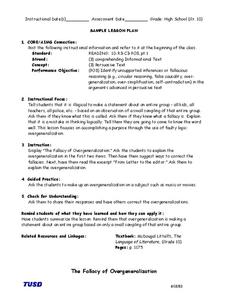EngageNY
End of Unit 1 Assessment: Inferring and Synthesizing (From Two Texts) About Life in Colonial America
Close your colonial America unit with a performance-based assessment. Class members will show their proficiency in several skills including using details to back up inferences, determining the meaning of words in context,...
EngageNY
Main Ideas in Informational Text: Analyzing a Firsthand Human Rights Account
Although this is part of a series, lesson plan nine has your class take a break from their close study of the Universal Declaration of Human Rights (UDHR) text to read the firsthand account “Teaching Nepalis to Read, Plant, and Vote” by...
EngageNY
Main Ideas in Informational Text: Analyzing a Firsthand Human Rights Account for Connections to Specific Articles of the UDHR
Lesson 10 in a series of human rights lessons focuses on the skills of finding evidence and summarizing. Your young readers work to compare the two texts they have read in this unit: the Universal Declaration of Human Rights...
California Education Partners
Telescopes
An assessment challenges scholars to read an informative text then respond with an explanatory essay. The exam begins as participants read a text passage twice then take notes, making sure to jot down key details. Following the...
California Education Partners
We Are The Ship
An assessment sheds light on scholars' ability to read, gather evidence, and draft an original written composition. Learners read an informative text twice before taking notes and discussing their thoughts and textual evidence with a...
EngageNY
End of Unit Assessment, Part 1: Drafting Body Paragraphs of an Essay to Inform
Anybody can write a body paragraph! Pupils analyze the development of ideas in a body paragraph from a model essay. Next, using what they've learned, they draft the body paragraphs of their My Rule to Live By informative essay.
EngageNY
End of Unit Assessment: Writing a Rainforest Field Journal Entry about Howler Monkeys
Give me more details. Scholars complete an end of unit assessment by creating an information text box to go with their field journal entries about howler monkeys. Learners use the class time to work independently.
Lakeshorelearning
Read and Write about It
Reading informational text is a skill that transcends subjects and grade levels. Practice reading about different topics in various formats with a language arts lesson that includes opportunities for writing and research as well.
One Stop English
A Lesson on Register
The classroom might not be the best place for informal language, but it's a great place to teach middle and high schoolers how to identify the correct language register for their audience. A short lesson on formal and informal language...
EngageNY
Conducting Research: Analyzing a Variety of Sources to Capture Information about My Insect
From picture to words. Scholars analyze a picture of an ant and then list two facts they observed and any questions that may arise. Expert groups from the previous instructional activity then look at a diagram about either an ant or...
Curated OER
The Newspaper Article
Have your class participate in an interview activity using an informational text about the Amazon. After reading a Cultural Connections story about a person from the Amazon, middle schoolers write interview questions based on the text....
National Council of Teachers of English
Writing Acrostic Poems with Thematically Related Texts in the Content Areas
Scholars scour thematically aligned texts to gather a bank of words they can use in an original acrostic poem.
Curated OER
Fluency Passages, 3rd Grade
What would it be like to travel in a covered wagon? Learn about the life of a pioneer with a short informational reading passage. Kids read four paragraphs about traveling in a covered wagon and how it is different than traveling today,...
PBS
Reading Adventure Pack: Animals
Scholars explore the animal kingdom with help from two texts, Blueberries for Sal by Robert McCloskey and A Bed for the Winter by Karen Wallace. The literature and informational text set the learning stage for thoughtful discussion and...
Curated OER
Identifying Text Features of a Self-Written Fable
Make learning the parts of a book fun by having pupils construct their own glossary entries, table of contents, and title page. Beginning with a review of text features and a hunt for examples, kids use previously written fables to...
Curated OER
Lesson 4: The Judiciary: A Brief Introduction to the Courts System
Focusing on the judicial branch of government, the fourth lesson in this series explores the structure of the US courts system. Beginning with an engaging activity based on the short story The Lady or the Tiger, students go on to examine...
K20 LEARN
The K20 Chronicle, Lesson 1: What Makes a Good Article?
Good news articles are engaging, informative, and often compelling. In the first lesson plan of the four-part series, young journalists analyze and evaluate news stories about former NBA player Enes Kanter Freedom. They learn about the...
EngageNY
Reading and Taking Notes on Colonial Trades
In the tenth instructional activity of this unit, young scholars learn to categorize information as they continue researching their colonial trade. During guided practice, the teacher models how to read informational text slowly while...
Curated OER
Using Information Resources: Lesson 1
Eighth graders examine, brainstorm, cluster, and skim how to use a variety of information resources to assist them in projects or reports. In addition, places to find those information resources as well as the parts of a book is covered...
Curated OER
Get in the Newspaper Habit
Dive into journalism with your high schoolers! The resources provided here will help your learners write unbiased, clear, and succinct newspaper articles. First they spend time sifting through stacks of articles, filling out a graphic...
Curated OER
Caves
Explore caves with your class! Your scholars will participate in scientific observation, research, inference and deduction, reading, vocabulary, and writing activities about caves with this lesson plan. This resource contains five...
Core Knowledge Foundation
The History of the Earth Tell It Again!™ Read-Aloud Anthology
A read-aloud anthology focuses on Earth's history. Over three weeks, young scholars listen to and discuss stories about the layers of the Earth, minerals, fossils, different kinds of rocks, and dinosaurs. After the lesson's text, each...
Curated OER
Is That a Fact?
Investigate popular scientific claims and gather evidence to defend or argue against an author's stance. Writers synthesize information and compose their own "Really?" columns modeled after those found in the weekly "Science Times"...
Curated OER
Comprehending Informational Text
Do you know what a fallacy is? Discuss this term and its meaning with your class. Then, talk about why making generalizations about a large group of people isn't the best thing to do. As a group, study the included letter excerpt. It...







